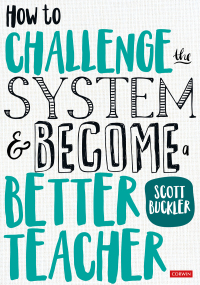Buy How to Challenge the System and Become a Better Teacher 1st Edition PDF ebook by author Scott Buckler – published by Sage Publications Ltd (UK) in 2021 and save up to 80% compared to the print version of this textbook. With PDF version of this textbook, not only save you money, you can also highlight, add text, underline add post-it notes, bookmarks to pages, instantly search for the major terms or chapter titles, etc.
You can search our site for other versions of the How to Challenge the System and Become a Better Teacher 1st Edition PDF ebook. You can also search for others PDF ebooks from publisher Sage Publications Ltd (UK), as well as from your favorite authors. We have thousands of online textbooks and course materials (mostly in PDF) that you can download immediately after purchase.
Note: e-textBooks do not come with access codes, CDs/DVDs, workbooks, and other supplemental items.
eBook Details:
Full title: How to Challenge the System and Become a Better Teacher 1st Edition
Edition: 1st
Copyright year: 2021
Publisher: Sage Publications Ltd (UK)
Author: Scott Buckler
ISBN: 9781526446213, 9781000217483
Format: PDF
Description of How to Challenge the System and Become a Better Teacher 1st Edition:
This book discusses which is the most appropriate tax dimension to best manage the new horizons of the global and digital economy. In this perspective, the efficiency of the main models is examined and two fundamental proposals are put forth: the first one aims at a coordination of the Destination-Based approach with the role of some specific digital assets, such as user data; the second one is a framework for a possible futuristic tax phenomenon all internal to the world of the internet and not linked to traditional territorial States. The compliance of these models with the constitutional principles that western democratic systems have affirmed over time in matters of taxation is then analyzed with particular regard to legal certainty, consent to taxation and to the re-distributive function of taxes. A specific evaluation of the role of the European Union is carried out and the jurisprudence on financial interests of the Union and on State aids is analyzed and tackled in light of the Treaty on the Functioning of the European Union and of the tax sovereignty of member States. The conclusion is that the model of the organization with a general political purpose, from which modern States take their inspiration, appears unfailing for a tax project that would focus on the good and the growth of the person and of the social aggregations in which everyone lives. A model that therefore deserves to be safeguarded, although with new methods and instruments, starting from a Destination-Based Asset-Coordinated approach, in the Third Millennium. The book will be of interest to researchers and academics in international tax law, constitutional law and in political science.





